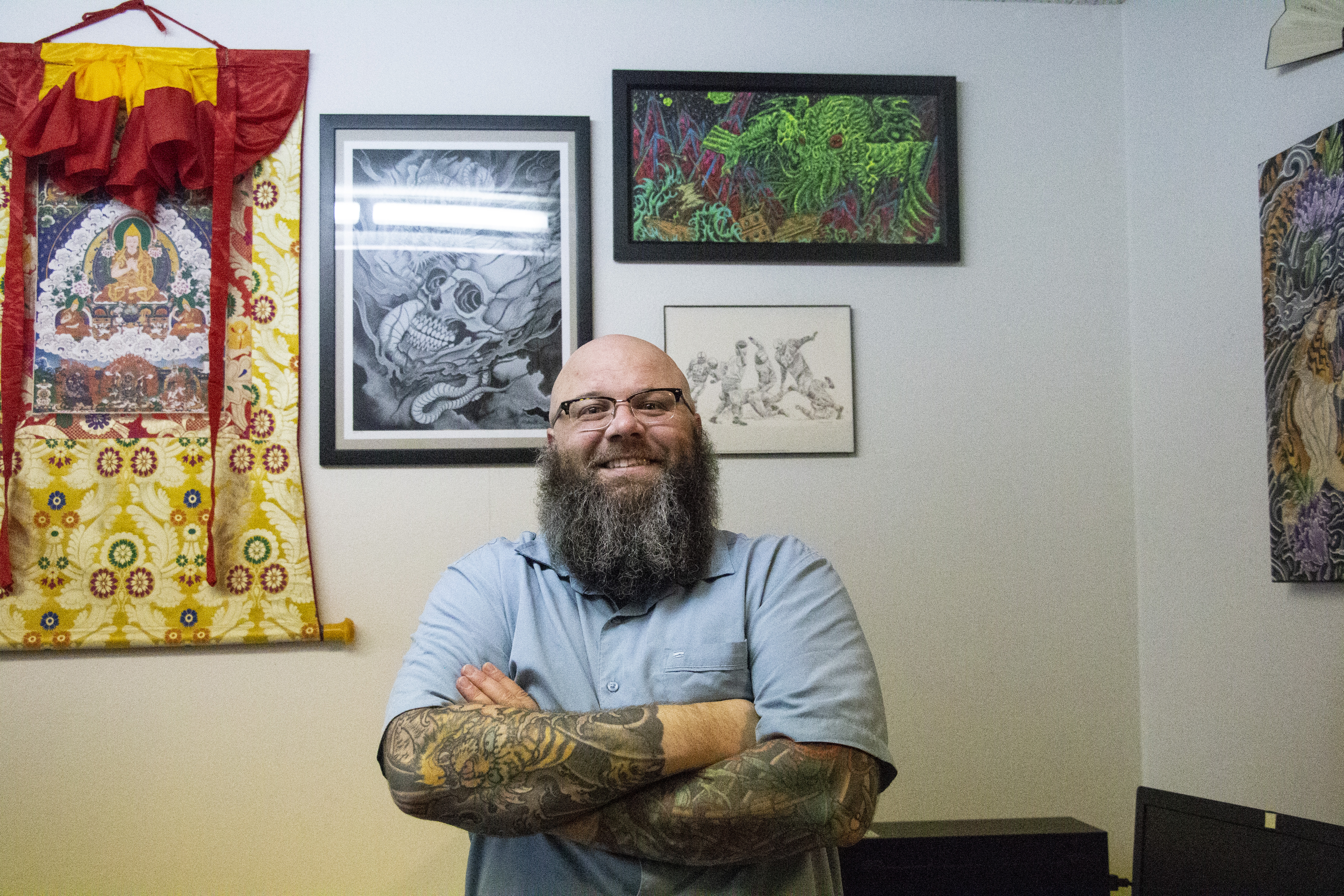
One professor is making his mark with a unique class
“Marks of Civilization” is a unique class that USD offers, it the only one of it’s kind in the United States.
David Lane, assistant professor in sociology, teaches the course. In the class, he teaches the literature of cultural production when it comes to tattooing. He said teaching a class that’s not offered anywhere else is odd.
“It’s an entire creation from me,” Lane said. “It’s really difficult to do something new in this sense that nobody’s done it on tattooing. The good part is I know all that literature.”
One of the assignments for the class is that the students have to spend time around tattooers in a tattoo shop.
“I think with inductive scholarship, if you’re going to gather data, you ought to be where the data are,” Lane said. “I’m a firm believer that you ought to actually see what’s happening.”
Joshua Fox, a senior psychology major, took “Marks of Civilization” in fall 0f 2017. He said he enjoyed doing his field project for the class.
“We had to do some sort of presentation that had to do with the tattooing process and one of the theories,” Fox said. “With my group, I did Goffman’s Stigma (a theory of social stigma) and if tattooing is still considered a stigma in today’s society. So what we ended up doing is we got fake tattoo sleeves for our arms and we walked around like a mall and saw if there (were) results.”
Lane said he senses that there is a shift happening in the world when it comes to the stigma of tattooing.
“In the last 20 years or so, we’ve seen a lot more people becoming aware of the body,” Lane said. “Now that’s not just tattooing, but the body and what it means to exist in these things that we’re not just bags of bones and guts. That there’s something more to this physical experience of existence.”
While there (have) been studies of tattooing done in the past, Lane said it’s just resonating more now in our culture.
“Historically we’ve lived in a really repressed society about the body,” Lane said. “Religion and what not tells us our bodies shouldn’t be fun and people are finding out bodies are a lot of fun.”
Lane said that tattooing has always existed in every society, but there has been a rise in tattooing in the Western world.
“We’re at a point historically, though, where our lives, our identities, the worlds we live in, increasingly become similar,” Lane said. “I think part of the demand for tattooing stems from us living in this world where our spaces are increasingly the same so we can’t claim a distinct identity from these spaces that we inhabit. Instead, we can mark our bodies and reclaim control over it in an individualized sense.”
Jessica Allen, a first-year law student, took “Marks of Civilization” in the fall of 2017. She said she doesn’t think many people think of tattooing as a subject to be studying.
“(That is) something we saw with how limited reading we had with different authors,” Allen said. “Also the stigma of having a tattoo hasn’t really become (accepted) in the United States. I think there needs to be an understanding in America of what exactly the subject is and it’s not just getting a tattoo.”
Lane said when it comes to his research for tattooing, he doesn’t do what everyone else does. While most researchers focus on the meanings of tattoos, Lane said he focuses on the tattoo artists themselves.
“Everyone else studies what tattoos mean and I study what tattoo workers themselves do,” Lane said. “They’re asking the same kinds of questions and I’m trying to ask an entirely different question.”
He also has a book that is under contract and he hopes to have out in a year. He said the book is about the time he spent in Baltimore around tattooers trying to understand their way of life.
“The short story is I’m exploring the world of tattooing as a kind of art world,” Lane said. “There are hierarchies, there are methods of socialization, there are typical careers people pass through. Then I’m also exploring how the physical layout of the city itself affects the aesthetics that tattooers produce and often it ends up reproducing classed or raced bodies.”
One thing Lane said he wants people to understand about tattooing is simply that he wants to see awesome tattoos.
“I think to do that, we need to have an educated consumer that’s going to demand more from tattooers,” Lane said. “This isn’t to demean tattooers, but there are a lot of them that have gone into the occupation that could pan out to be highly skilled one day but (are not) producing highly skilled things now. The aesthetics of tattooing are not going to improve unless people push the tattooers to be better.”

